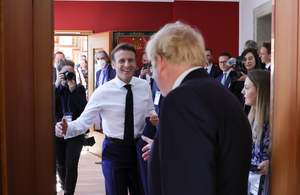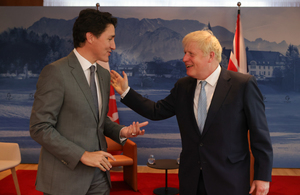PM to tell G7 leaders: we must end Putin’s stranglehold on food prices
- Putin’s blockade is driving up international food prices, depriving the Ukrainian people of essential income and placing millions on the brink of starvation
- UK working with partners on a plan to overcome the Russian stranglehold and will work with Ukraine to repair vital railways
- Government also working on other measures to increase the global food supply and keep costs down for households everywhere
The Prime Minister will call on world leaders to take urgent action to get essential food supplies out of Ukraine at the G7 Summit today (Monday).
The Russian blockade of major Ukrainian ports such as Odesa, attacks on farms and warehouses, as well as other huge structural issues caused by the Russian invasion, have prevented Ukrainian food from reaching the global market.
Ukraine is the ‘breadbasket of Europe’, supplying 10% of the world’s wheat, 12-17% of the world’s maize and half of the world’s sunflower oil. 25 million tonnes of corn and wheat – the entire annual consumption of all the least developed countries – can’t be exported and is currently at risk of rotting in Ukrainian silos. This problem is due to worsen dramatically with July’s harvest.
Russia’s actions have driven up prices in countries like the UK and, while the UK is not directly dependent on Ukrainian grain exports, the ongoing blockade has placed 47 million people around the world on the brink of humanitarian disaster.
Addressing the G7, the Prime Minister will emphasise that this crisis – which has far-reaching global consequences – requires an internationally-coordinated solution.
To support Ukrainian efforts to find and develop routes out of the country the UK is offering expertise to create a safe passage for commercial vessels. We are working with Ukraine, the UN and other international partners to find solutions to frustrate the Russian stranglehold, which can then be implemented by Ukraine and its international supporters.
Last week the Foreign and Defence Secretaries travelled to Türkiye for discussions with the Turkish Government on opening maritime export routes.
In addition to preventing grain from leaving Ukraine via the Black Sea – the route by which 96% of Ukraine’s grain has historically been exported, Russian attacks are disrupting rail exports.
To counteract this, the UK is contributing up to £10 million in materials and equipment to Ukraine Railways to repair rail infrastructure and help get grain out of the country by rail. The UK is in close discussion with the Government of Ukraine about how to maximise their rail capacity and keep both trains and grain moving.
The Prime Minister will tell G7 leaders today:
Putin’s actions in Ukraine are creating terrible aftershocks across the world, driving up energy and food prices as millions of people are on the brink of famine.
Only Putin can end this needless and futile war. But global leaders need to come together and apply their combined economic and political heft to help Ukraine and make life easier for households across the world. Nothing should be off the table.
Not only is Russia preventing Ukraine from exporting its grain, there is increasing evidence that Russia is stealing grain from Ukraine, smuggling it over the border to sell and boost Putin’s war coffers.
The UK will put £1.5 million to develop a testing process to identify whether grain sold by Russia on the world market has been illegally taken from Ukraine. This would allow world governments to tackle the scourge of stolen grain, deterring Russian activity and ensuring Ukraine is getting the revenue it so desperately needs from any grain it grows. The PM will ask other G7 countries to join these efforts today.
Last week at the Commonwealth Heads of Government Meeting the Prime Minister announced an additional £372 million for countries most impacted by rising global food prices.
He also encouraged G7 leaders to look at their demands on land and use of biofuel – globally, the use of grain for biofuel is contributing to reduced availability and increased costs for human consumption. That is something the Prime Minister will be raising at the G7 today.

